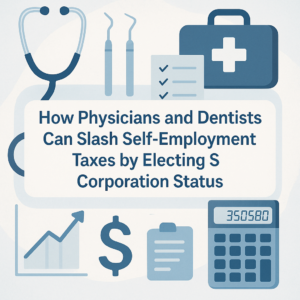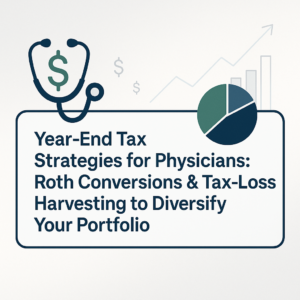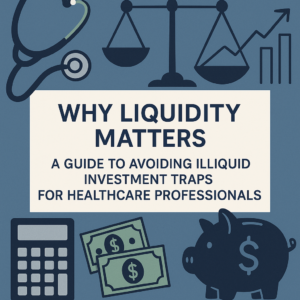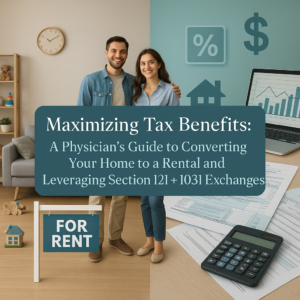As a young healthcare professional, whether you are a doctor, dentist, pharmacist, physical therapist, or psychologist, planning for your financial future is crucial. Navigating the world of retirement planning can be complex, but understanding financial tools like Roth IRAs can significantly impact your long-term financial health. One strategy that has gained attention for its potential benefits is the Roth IRA conversion. This blog post will dive into the concept, benefits, and considerations of Roth IRA conversions, helping you decide if this move is right for your retirement strategy.
What is a Roth IRA Conversion?
A Roth IRA conversion involves moving funds from a traditional IRA to a Roth IRA. This process includes converting contributions and acknowledging the tax implications involved. Although it might sound straightforward, this shift has several financial ramifications worth exploring.
The Basics
- Traditional IRA vs. Roth IRA: In a traditional IRA, contributions are often tax-deductible, and the investment grows tax-deferred until withdrawn in retirement. A Roth IRA, on the other hand, is funded with after-tax dollars, but qualified withdrawals in retirement are tax-free.
- Conversion Process: Converting funds from a traditional IRA to a Roth IRA means that the amount converted will be treated as taxable income for that year. Consequently, you’ll pay taxes on the converted amount at your current tax rate.
Impact on Gross Income
The entire amount converted from a traditional IRA to a Roth IRA is added to your income for the year. This additional income could push you into a higher tax bracket, affecting not just your state and federal income taxes but also other aspects of your financial situation, such as eligibility for certain tax credits or deductions.
Increased Tax Liability
Converting a sizeable IRA can lead to a substantial tax bill. It’s essential to consider the immediate tax implications versus the long-term benefits of tax-free withdrawals in retirement. Understanding your current and future income projections is crucial in making an informed decision.
State vs. Federal Taxes
Different states have varying tax laws, so the immediate tax hit from a Roth IRA conversion may differ depending on where you live and work. Ensure you understand both state and federal tax implications.
Eligibility for Tax Credits and Deductions
Converting large sums might affect your eligibility for certain tax credits and deductions. For example, if you have dependents, the amount converted can influence your ability to qualify for child tax credits or education-related deductions. It is crucial to factor in how these changes might impact your overall tax situation.
Benefits of Roth IRA Conversions
While the upfront tax hit can be significant, the long-term advantages of Roth IRA conversions often outweigh the initial cost, especially if you expect to be in the same or a higher tax bracket during retirement.
Tax-Free Withdrawals
One of the most attractive features of a Roth IRA is the ability of tax-free withdrawals in retirement. Unlike traditional IRAs, where withdrawals are taxed as regular income, Roth distributions are entirely tax-free, provided you meet the necessary conditions.
Elimination of Required Minimum Distributions (RMDs)
Traditional IRAs require account holders to begin taking minimum distributions starting at age 72-75 (depending on the year you were born), which can increase taxable income during retirement. Roth IRAs, however, do not have RMDs, allowing your investments to grow tax-free for as long as you live.
Potential for Tax-Free Growth
With a Roth IRA, your investments can grow without the drag of taxes. Over the long term, this can significantly boost your retirement savings. For young healthcare workers with a longer investment horizon, this tax-free growth can be particularly beneficial.
Considerations Before Converting
Before deciding to convert, it is important to consider factors like the immediate tax implications and the potential long-term benefits. The upfront taxes might outweigh the future benefits for some, especially if they are close to retirement or expect to be in a lower tax bracket in the future.
Upfront Tax Hit
Converting funds means paying taxes now. The larger your conversion amount, the heftier your tax bill will be. For those early in their careers, balancing student loan payments, housing costs, and other financial obligations, this may be a significant consideration.
Long-Term Tax Projections
Consider your long-term tax outlook. If you anticipate higher earnings in the future, converting early in your career when your tax rate might be lower could be advantageous. On the flip side, if you expect to be in a lower tax bracket in retirement, it may be wise to defer converting until later.
Nearing Retirement
If you are nearing retirement, the benefits of a Roth IRA conversion may be less impactful due to the shorter investment horizon. Additionally, paying a large tax bill close to retirement could deplete funds needed for immediate retirement expenses.
Impact on Financial Aid and Student Loans
For young healthcare workers, it’s essential to consider how a Roth IRA conversion might affect financial aid for dependents and student loan repayment plans. Increased taxable income could influence eligibility for income-driven repayment plans and financial aid packages.
Strategic Timing and Planning
Strategically timing your conversions can be beneficial. For instance, converting in years when your income is unusually low could minimize tax impact. Partial conversions over several years can also help in managing the overall tax liability.
Optimal Times for Conversion
- Low-Income Years: Converting in a year when your income is lower than usual—such as during a sabbatical, medical leave, or further education—can reduce the tax impact of your conversion.
- Market Downturns: Converting when the market is down can have tax benefits, as the value of your investments would be lower, resulting in a smaller taxable amount when converting.
Partial Conversions
Rather than converting the entire traditional IRA at once, consider partial conversions over a span of several years. This strategy can help spread out your tax liability and prevent pushing you into a higher tax bracket.
Comprehensive Planning
It’s crucial to incorporate Roth IRA conversions into your broader financial plan. Work with a financial advisor to map out your conversions, considering factors such as income projections, market trends, and personal financial goals.
Balancing Student Loans and Conversions
Young healthcare professionals often have significant student loan debt. It’s important to strategize how paying off loans and converting to a Roth IRA can be balanced effectively, making sure neither the tax impact nor loan repayment is compromised.
After exploring the ins and outs of Roth IRA conversions, it is clear that while the process offers several potential benefits, it is not without its complexities and considerations. For young healthcare professionals, Roth IRA conversions can be an effective tool for retirement planning, providing tax-free growth and withdrawals, along with the elimination of RMDs.
We encourage readers to consult with a financial advisor to determine how Roth IRA conversions might fit within their broader retirement strategy. Comprehensive planning and a clear understanding of the tax landscape are crucial to making informed decisions.
A strategic approach, considering both immediate and long-term financial impacts, will ensure you make the best decisions for your future. Regular financial health check-ups and updates with a trusted advisor are vital to navigate the complexities of Roth IRA conversions and retirement planning effectively.
Disclaimer: This article is for informational purposes only and should not be considered as financial or tax advice. Readers should consult with a financial advisor or tax professional to discuss their unique situation before making any financial decisions.






